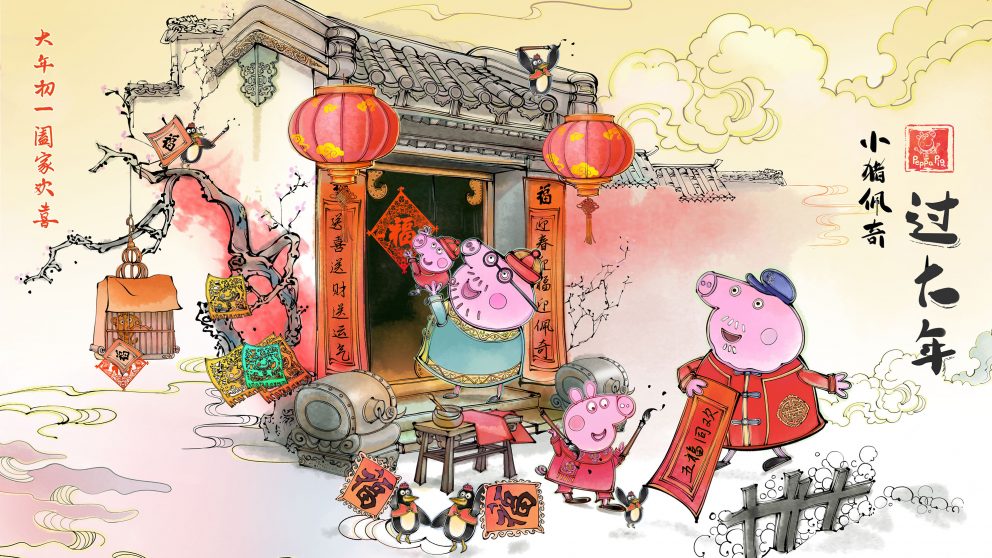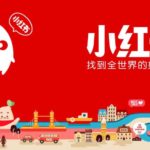How Peppa Pig went from banned to viral right before the year of a pig | Daxue Consulting
Peppa Pig is a popular cartoon series from the UK, which has been screening in China since late 2015. Recently, a 5-minute video titled “What is Peppa” (啥是佩奇,Sha Shi Peiqi?, Peiqi is the Chinese translation for Peppa) caused a huge response among Chinese netizens. This video has received an enormous number of views and the hashtag “WhatIsPeppa” on Sina Weibo has got over 1.6 billion views, in which over 1 million Chinese netizens have participated in the discussion.
Actually, “What is Peppa” is a promo video for the upcoming movie “Peppa Pig celebrates Chinese New Year”. The movie is co-produced by Alibaba and Canadian media company Entertainment One. It will hit Chinese screens on Feb. 5, 2019, the first day of the Chinese Lunar New Year.
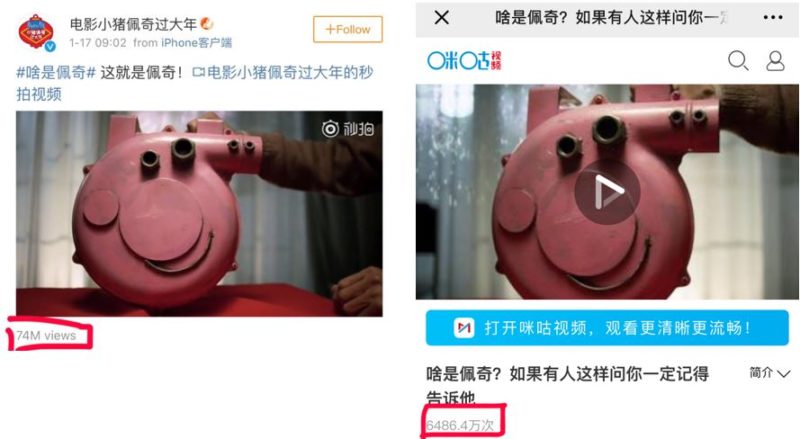
Screenshots: movie promo video posted by Weibo “Peppa Pig celebrates Chinese New Year” official account on Jan 17th, 2019 has received over 74M views so far (left); the video posted on the same day on WeChat through video sharing platform Migu (咪咕视频) has received over 64M views so far.
In this video, a grandson tells his grandpa he wants ‘Peiqi’ (Peppa) for the New Years. The grandpa utilizes all resources he has available in his rural villiage to figure out what ‘Peiqi’ means, creating a hilarious narrative on the differences between rural and urban China. In the end, he surprises his grandson with a hand-made Peppa modified from a wind blower.
This video evoked deep emotion in many Chinese; most of the scenes were shot in a village showing the daily life of grandparents who remain in their rural homes, to which many Chinese people can relate. The grandpa, who can be described as old-fashioned and stubborn, reminds many Chinese audiences their own grandparents living in rural areas. This character is also lonely and expresses a desire to see his family more often.
The Lunar New Year, also called Spring Festival, is the most important traditional holiday in Chinese culture. It signifies happy family reunions, no matter how far the family members are living nowadays, people overcome distance and difficulties to return to their hometowns. We can feel the grandpa’s heartbreak when he thought his family won’t visit him during the Spring Festival. This episode also makes all the spectators worry as it touches a very sensitive topic. In the last scene when the grandpa finally meets his family and takes out the special gift he made for the grandson, many Chinese netizens claim to almost burst into tears.
As China is getting more and more urbanized and the pace of life increasing, Chinese people are even more appreciative of their traditional festivals. When a massive amount of Chinese people from rural parts of the country are leaving their homes and elderly behind to pursue a better life, they are faced mixed feelings such as homesick, loneliness and sometimes even guilt.
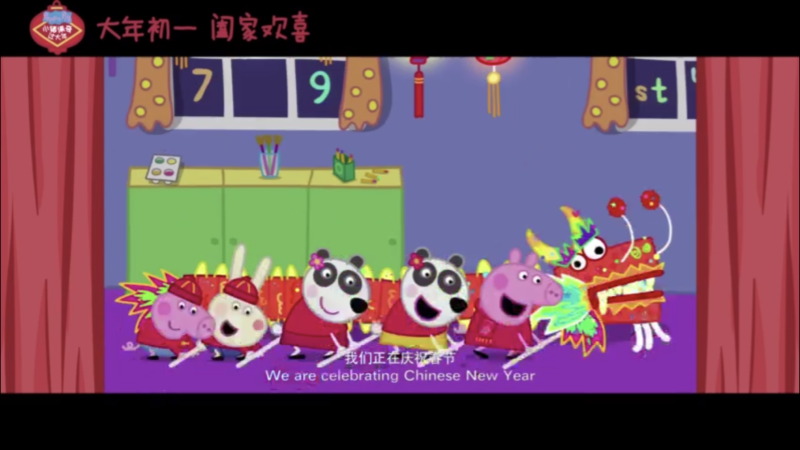
Screenshot of “Peppa Pig celebrates Chinese New Year” movie trailer
This promo movie mixed the sentimental element with many humorous details, by following the grandpa’s journey of finding out what Peppa is, the story successfully caught Chinese audiences’ hearts. Premiering just before the “Year of the Pig” in China, Alibaba Pictures and Canadian media group Entertainment One want to draw young families to the theater as a way of celebrating the national holiday. From the responses on Chinese social media we have seen, the strategy is going to work.
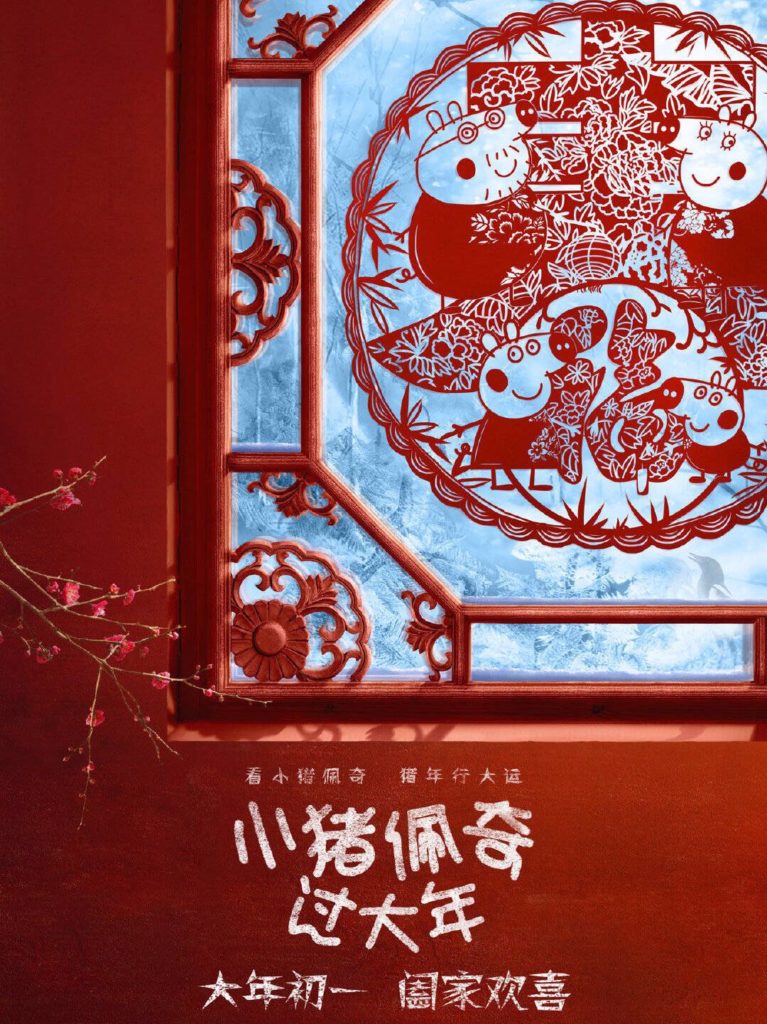
Peppa Pig celebrates Chinese New Year” movie poster
Peppa Pig is not only loved by Chinese children and their parents since 2017 this little pink piggy has caused many buzz topics in China. There have been fan videos online of Peppa talking different Chinese dialects as well as various fan-made Peppa Pig chat stickers and emojis. The most sensational issue about Peppa is that the wildly popular children’s character was banned from Douyin, a video sharing platform in China, which deleted more than 30,000 clips. The hashtag #PeppaPig was also banned. The reason why is that Peppa was jokingly cast as a shehuiren (社会人 “society people”, a slang term for lowlifes and gangsters).
Localization tips in the Chinese market
For international brands, it is extremely important to understand the Chinese culture to be able to engage with them. Like Connie Chan, a partner at venture firm Andreessen Horowitz, said in the Twitter thread: “This Peppa trailer reflects a deep, deep understanding of Chinese culture: family duty, generational love, rural cities, community, Chinese New Year.” She announced. “Touching the heartstrings through a deep cultural connection is the most powerful kind of localization and marketing!”
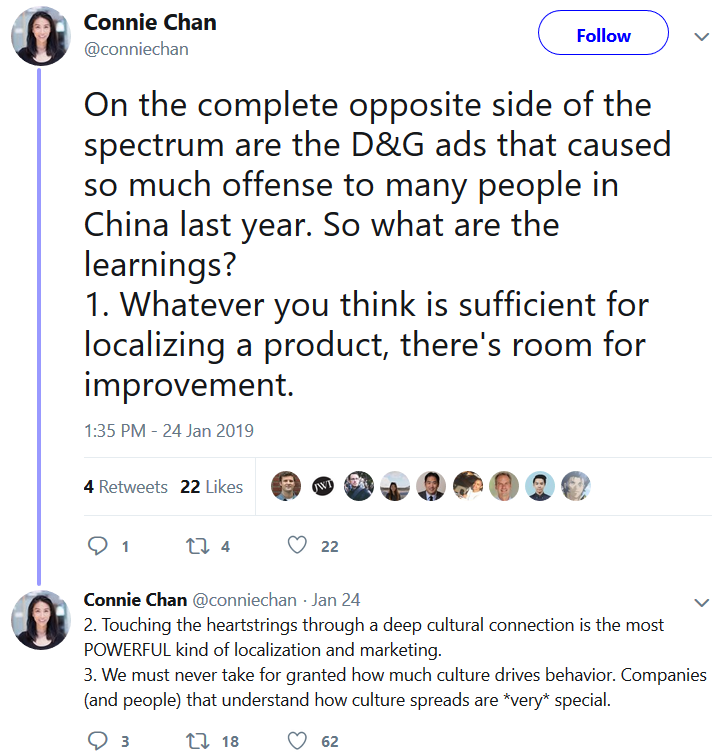
Screenshot https://twitter.com/conniechan
Author: Chencen Zhu
Daxue Consulting helps you get the best of the Chinese market
Do not hesitate to reach out our project managers at dx@daxueconsulting.com to get all answers to your questions.


